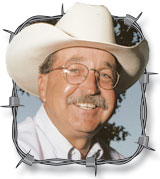One of the reasons I enjoy farming so much is that I get to make decisions that impact my profitability several times each day. One of the major drawbacks to being a farmer is that I must make decisions that impact my profitability several times each day.
Now I know there are other professions where critical decision-making is a key component in the difference between success and failure. But, unless you own your own business, those decisions usually require the input of several people, approval of your boss or adherence to acceptable policies and procedures that are already in place. Those of us in farming are usually flying by the seat of our pants.
How many acres of which crops do I plant this year? Which heifers do I retain and which bulls do I use? How much can I pay for fertilizer and seed? When do I sell the livestock or grain I produce? Should I purchase a new piece of equipment or make major repairs on the old stuff? These are only a smidgen of the questions farmers have to ask themselves constantly and the answers have to come from the same person asking the questions. It’s a wonder we can ever get any sleep.
Of course, all the questions aren’t so dramatic. Ones like deciding when to cut hay or plant crops may depend entirely on the weather forecast. Unfortunately, most of those forecasts are made by someone who is more concerned about the possibility of a picnic being rained out than losing $10,000 worth of seed or reducing the hay quality by just as much. I’m just saying…
This past winter, I pondered the decision of whether to trade tractors or not. My old tractor was still in relatively good shape, but I’d made a little money last year and could use the tax deduction. In my mind I rationalized that it made sense to trade because my trade-in value would never be higher and, at my age, this would most likely be the last tractor I would ever purchase. (I’ve never said my decision-making process is anything close to scientific.)
Last week, I was giving my new tractor its first serious work-out as I baled hay at the hill farm. All the bells and whistles were working as advertised and I was truly enjoying the experience. As I stopped to eject a bale on the steepest slope in the field, I remembered how years past had almost always resulted in a bale rolling down the slope and through the fence. Understanding that I had made bad decisions before, I backed the baler at an angle to the slope so the bale wouldn’t roll down the hill. I was proud of myself for making one of those small decisions that had been shaped by past experience.
Unfortunately, the bale I had just formed in the chamber was not one of my best. Being significantly smaller on the downhill side, the bale began to roll, curve to the south and pick up speed. Watching all this through the fancy rearview mirrors (my old tractor was not such equipped), I made another decision – I would race the new tractor to the area of the fence for where the rolling bale was bound and throw a block that would make an NFL offensive lineman proud.
Since the new tractor goes quite fast, I made it to the area ahead of the bale. My decision-making mind, however, was still engaged as I watched the 1,200 pound speeding bale getting closer. I remembered that my new tractor had a list price that was more than what I had given for this farm 20 years ago. The section of the fence that would most surely be wiped out, would probably only cost a couple of hundred dollars and a few hours of work. I gunned the tractor again, only to watch the speeding bale whiz past the rear of the baler – and through the fence.
Decisions, decisions, decisions.
Jerry Crownover is a farmer and former professor of Agriculture Education at Missouri State University. He is a native of Baxter County, Arkansas, and an author and professional speaker. To contact Jerry about his books, or to arrange speaking engagements, you may contact him by calling 1-866-532-1960 or visiting ozarksfn.com and clicking on ‘Contact Us.’






